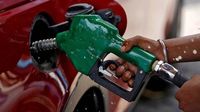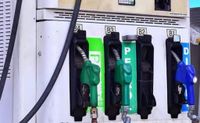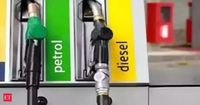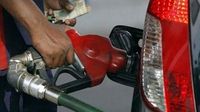In a significant move that has sparked controversy, the Indian government announced on April 7, 2025, an increase in excise duties on petrol and diesel by Rs 2 per litre. This change is set to take effect on April 8, 2025, as confirmed by a notification from the Department of Revenue.
The excise duty on petrol will rise from Rs 19.90 to Rs 21.90 per litre, while the duty on diesel will increase from Rs 15.80 to Rs 17.80 per litre. Despite this increase, Union Minister for Petroleum and Natural Gas, Hardeep Singh Puri, assured the public that oil marketing companies (OMCs) would absorb the hike, meaning that retail prices for consumers would remain unchanged. "Let me clarify upfront on the record, this will not be passed on to the consumer," Puri stated, explaining that OMCs carry inventories over a 45-day period, which mitigates immediate impacts on retail prices.
As global crude oil prices have recently dipped to their lowest levels since April 2021, with Brent crude falling to $63.35 a barrel and U.S. West Texas Intermediate dropping to $59.77, the timing of this excise hike raises eyebrows. Critics argue that the government is taking advantage of the situation to boost revenue rather than passing savings on to consumers. The latest figures indicate that Brent and WTI crude recorded weekly losses of 10.9% and 10.6%, respectively.
In the backdrop of this announcement, shares of major oil marketing companies saw declines on the Bombay Stock Exchange. Reliance Industries closed at Rs 1170.95 (down 2.80%), Indian Oil at Rs 128 (down 1.65%), Hindustan Petroleum at Rs 348.20 (down 2.75%), and Bharat Petroleum at Rs 275.65 (down 1.34%). Investors are understandably concerned about the implications of these rising duties amidst fluctuating oil prices.
Congress leader Mallikarjun Kharge has been vocal in his criticism of the government's decision. He accused the administration of exploiting the situation, despite international crude prices having fallen by 41% since May 2014. "The government has chosen to raise excise duties instead of passing on the benefits to consumers," Kharge stated, expressing outrage over the government's inaction regarding the stock market's significant downturn, where investors reportedly lost Rs 19 lakh crore. He attributed this market decline to what he described as the government's "Kumbhakarani sleep" on tariff policy.
For consumers, the current retail prices of petrol and diesel in major Indian cities remain as follows: in Mumbai, petrol is priced at Rs 103.50 per litre, while diesel is at Rs 90.03; in New Delhi, petrol costs Rs 94.77, and diesel is Rs 87.67; in Chennai, petrol is Rs 100.80, and diesel is Rs 92.39; in Bangalore, petrol is Rs 102.98, and diesel is Rs 88.99; and in Hyderabad, petrol stands at Rs 107.46, with diesel at Rs 95.70.
This latest change in excise duties comes on the heels of the government's recent actions regarding fuel pricing. The last reduction in fuel prices occurred on March 14, 2025, just before the Lok Sabha elections, following a period of price freezes that began on May 22, 2022. During that freeze, two cuts in excise duty were made, which collectively reduced petrol and diesel excise by Rs 13 and Rs 16 per litre, respectively.
The government has faced scrutiny for its approach to excise duties in the past. Since Prime Minister Narendra Modi took office in 2014, the administration has frequently raised excise duties whenever international oil prices fell. Between November 2014 and January 2016, for example, the government hiked excise duty on petrol and diesel nine times, which more than doubled the government's excise revenue from Rs 99,000 crore in 2014-15 to Rs 2,42,000 crore in 2016-17.
Despite the government's assurances that the retail prices will remain unchanged, the increase in excise duties is likely to impact consumers who are already grappling with inflationary pressures. The timing of this hike, especially amid the uncertainty surrounding former U.S. President Donald Trump’s tariffs, has raised concerns that higher fuel costs could further squeeze household budgets and drive up transportation and commodity prices.
Industry analysts are closely monitoring the situation, particularly as crude oil futures have fluctuated significantly. On April 7, crude oil futures decreased by Rs 134 to Rs 5,186 per barrel in futures trade, reflecting ongoing market volatility. As participants adjust their positions in response to weak demand in overseas markets, the implications for both domestic prices and government revenue remain to be seen.
In summary, while the government’s decision to increase excise duties aims to shore up revenue amidst fluctuating global oil prices, the potential impact on consumers and the broader economy is a matter of concern. With ongoing debates about the appropriateness and timing of such measures, stakeholders from various sectors will be watching closely as the situation develops.







